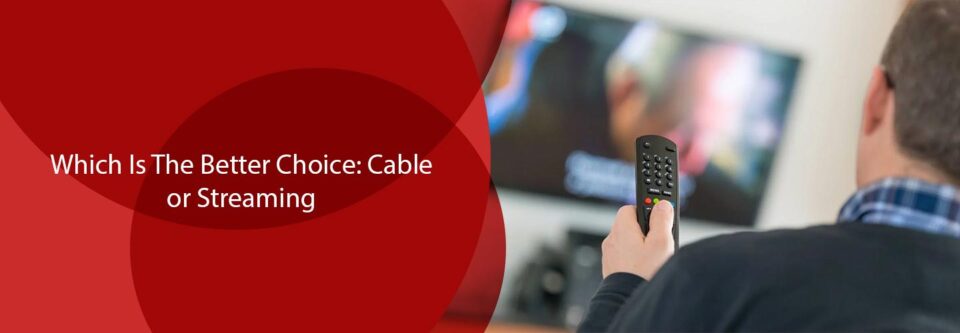The widespread belief is that, in the era of streaming and independent content production, cable is no longer necessary.
Why would you desire restrictions when you have so many possibilities available to you?
Right now, each of the two options—cable and streaming—has its own advantages. A recent CNBC study found that network and cable continue to draw close to 65% of all viewers. Whether you’re a movie buff or just looking for something to do on the weekends, you won’t want to miss this list.
In order to determine which the best choice is for you, we will compare cable vs. streaming. On a side note, if you are looking for a cable TV provider that offers the best options, WOW Cable TV is one of the best out there.
What Are the Benefits of Cable TV?
Cable television is still a common alternative since it is accessible, affordable, and full of excellent choices. Cable networks are watched by millions of Americans every day or every week.
To keep your interest, cable television provides a diverse selection of programming. In most cases, you’ll get at least 50 or 60 channels to pick from, plus more options on-demand like upcoming movies or documentaries.
Cable is very enticing if you don’t want to fiddle with subscription bundles and add-ons. You can continue to watch quality television, follow the national news, and occasionally come across a good movie.
The Drawbacks of Cable TV
Unsurprisingly, cable has declined in popularity due to its more constrained approach to content. Cable won’t satisfy someone with varied preferences who constantly wants to be aware of the most exciting developments.
Local news sources are typically absent from cable networks (unless you sign up for them). Additionally, you can miss out on important entertainment occasions like the Grammys, Oscars, or Emmys. Do you enjoy sports? There’s a chance that cable will meet you halfway.
If you enjoy anime, it is likely that you won’t use cable television and instead rely on a few streaming sites. Given that most cable companies operate under contracts, it is obvious why this choice has become less popular.
The Benefits of Streaming
Streaming is the way of the future with extremely adjustable rates and fantastic libraries. You’ll have access to just about everything you could possibly want to watch.
The original content available on streaming services ranges from the newest award-winning independent films to well-known television programs. You have a variety of choices, including anime, stand-up comedy, documentaries, interviews, and video essays.
With the simple press of a button, you can upgrade your subscription plan and then deactivate it when it is no longer necessary.
Want nothing to do with contracts? It’s unusual to discover a streaming service that doesn’t use a flexible subscription plan.
The Drawbacks of Streaming
Cable takes pride in being a multi-purpose package that does it all. Even while streaming is incredibly versatile and frequently up to current, it is still more constrained.
Can’t view the movies you want to see? Your streaming plan will need to be updated. Can’t locate your preferred program? You are out of luck because your streaming provider most likely lacks the necessary licenses for these titles.
Almost paradoxically, choice weariness and a lack of options are also drawbacks of streaming.
Choosing Between Cable and Streaming
There are several reasons why streaming is typically preferred over cable.
Cable is less practical than streaming. With streaming, you can view your preferred TV series and movies on any internet-enabled device, whenever you want.
This implies that you are not restricted to a certain place or time when watching your favorite shows on your TV, laptop, tablet, or smartphone. In contrast, watching your favorite shows on cable requires you to be at home in front of the TV.
Another significant difference is that streaming is typically less expensive than cable. With streaming, you have a large selection of subscription-based services to pick from, including Netflix, Hulu, and Amazon Prime, which provide a sizable library of TV series, movies, and other content for a reasonable monthly subscription.
In contrast, cable TV frequently involves a long-term contract and can be pricey, especially if you desire access to premium channels and exclusive content. Additionally, streaming has a broader selection of content than cable.
Because streaming services are not physically constrained in the same way that cable networks are, they can offer a considerably greater variety of material, including exclusive TV shows, movies, and a sizable on-demand library.
Cable TV, on the other hand, is constrained to the channels that are offered in your area and could not provide the same diversity of content.
When comparing streaming to cable, many consumers prefer streaming over cable because of its ease, low cost, and larger selection of shows. Streaming caters to all types of viewers, whether they are casual or die-hard TV fans.
All in all
Cable vs. streaming: which should you pick? It all comes down to your personal entertainment preferences and finances.
With a comprehensive plan that runs under a consistent contract, cable, most of the uncertainty is removed. In terms of content alternatives, it is likewise very constrained and frequently lags behind more recent works. Those who aren’t ready to commit yet can find the idea of a contract to be unpleasant.
Streaming is more flexible, more inexpensive, and delivers a wider variety of good content. Having too many options can make viewers frustrated when their favorite shows or films aren’t offered.

